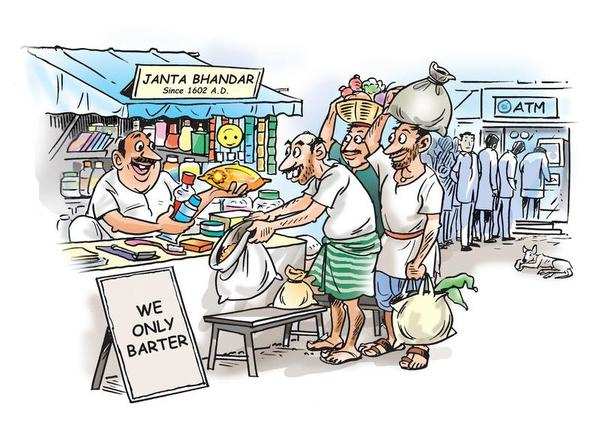
In a world dominated by digital transactions and cash economies, the concept of bartering—trading goods and services without money—might seem like a relic of the past. However, the barter system is experiencing a resurgence in India, driven by a blend of traditional values and modern needs. This blog explores the benefits and challenges of barter exchanges in India, shedding light on why this ancient practice is finding renewed relevance.
The Barter System: A Brief Overview
Bartering is the exchange of goods or services directly for other goods or services without using money. In ancient civilizations, barter was the primary method of trade. With the advent of currency and complex financial systems, barter largely faded from mainstream commerce. Yet, in recent years, there’s been a notable revival, particularly in India, where barter exchanges and companies are leveraging technology to facilitate these transactions.
Benefits of Barter Exchanges in India
1. Cost Savings
One of the most compelling advantages of barter is the potential for significant cost savings. Businesses and individuals can trade products or services they have for those they need, without spending cash. For example, a graphic designer might offer design services in exchange for web development support. This can be particularly beneficial for startups and small businesses with limited budgets, allowing them to access essential services without the immediate cash outlay.
2. Resource Optimization
Barter exchanges encourage the efficient use of resources. Businesses with surplus inventory or unused assets can trade these for other goods or services they require. This helps in optimizing resources that might otherwise be wasted. For instance, a company with excess office supplies can exchange them for marketing services, ensuring that the surplus is put to good use.
3. Strengthening Community Ties
Bartering fosters a sense of community and mutual support. By engaging in local barter networks, individuals and businesses can build relationships and trust. This can be particularly valuable in tight-knit communities or among local businesses. For instance, a local restaurant might barter with a nearby farm for fresh produce, strengthening local ties and supporting the community economy.
4. Flexibility and Creativity
Barter transactions allow for greater flexibility and creativity in deal-making. Parties involved can negotiate terms that are mutually beneficial and tailored to their specific needs. This flexibility can lead to innovative solutions and partnerships. For example, a freelance photographer might barter with a travel agency for a vacation package in exchange for professional photos, creating a win-win situation for both parties.
5. Reduced Financial Risk
In times of economic uncertainty or financial strain, bartering can mitigate risk by reducing reliance on cash transactions. For businesses facing cash flow issues, barter offers an alternative way to acquire necessary goods and services without depleting financial reserves.
Challenges of Barter Exchanges in India
1. Valuation Discrepancies
One of the main challenges in barter exchanges is determining the value of goods or services. Unlike monetary transactions where the value is clearly defined, bartering requires both parties to agree on the equivalent worth of their offerings. This can lead to disputes and dissatisfaction if the perceived value of items or services differs.
2. Limited Scope of Exchange
Barter systems are often limited by the scope of available goods and services. Finding a suitable match for what you need can be challenging, especially if the barter network is not well-established. For instance, a company that needs specialized equipment may find it difficult to locate a willing barter partner who has that exact equipment available.
3. Lack of Standardization
The lack of standardized practices in barter transactions can lead to inconsistencies and misunderstandings. Without a formal system in place, agreements can be informal and prone to misinterpretation. This makes it essential for participants to establish clear terms and conditions to avoid conflicts.
4. Legal and Tax Implications
In some cases, barter transactions can have legal and tax implications. The value of exchanged goods or services may need to be reported for tax purposes, and the lack of cash transactions can complicate accounting processes. Participants should be aware of legal requirements and ensure compliance to avoid potential issues.
5. Network Limitations
The effectiveness of barter exchanges often depends on the size and activity level of the network. In India, while there are various barter websites and companies, not all regions may have active or well-established networks. This can limit the opportunities for successful bartering, particularly in less populated or rural areas.
The Role of Barter Websites and Companies in India
Barter websites and companies in India play a crucial role in facilitating and modernizing the barter system. Platforms like BXI and Barter Exchange Network offer online solutions that connect individuals and businesses looking to trade goods and services. These platforms address some of the challenges associated with traditional bartering by providing a structured environment for transactions and helping to overcome valuation discrepancies through ratings and reviews.
Barter companies in India, such as Trade Bank and Swap Shop, also contribute by organizing barter events and creating networks where participants can showcase their offerings and find suitable exchange partners. These companies help streamline the barter process and increase its accessibility.
Conclusion
The barter exchange system in India presents a compelling alternative to traditional monetary transactions, offering benefits like cost savings, resource optimization, and community building. However, it also comes with challenges, including valuation discrepancies and network limitations. As barter websites and companies continue to evolve, they hold the potential to address these challenges and further integrate barter into the modern economy.
Whether for personal or business use, embracing the barter system can provide valuable opportunities to trade goods and services in innovative ways. As India continues to navigate economic changes, the barter exchange might well become an increasingly important component of the country’s commercial landscape.